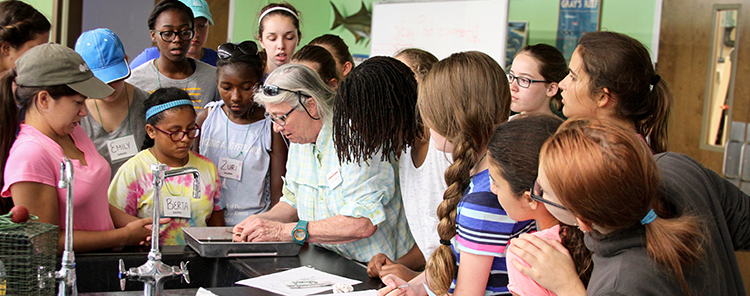Laboratory Studies
These activities emphasize individual work in well-equipped and modern laboratories.
Students use scientific equipment, standard specimen collection, professional laboratory techniques and group discussion to investigate a range of estuarine organisms and related biological, physical and chemical concepts.
To schedule a visit, contact Scheduling Coordinator Stephanie Edgecombe at sedge@uga.edu
or call 912-598-2335.
Fish Dissection (Grades 7-12, College, Adult)
Students compare features of a fish’s lifestyle to those of humans and other organisms in order to learn how fish are specifically adapted for life in the water. Combine this session with Introduction to Fishes and Fish Identification to investigate the external anatomy, internal organs and reproductive systems of bony fishes.
1.5 hours; min/max = 15/25;
$10/person additional lab fee
Microplastic Investigations in the Environment (Grades 9-12)
The experiences outlined below will offer high school teachers and their students opportunities to explore the global issue of microplastics closer to home. The programs focus on coastal Georgia, providing participants with background information, practical, hands-on field experiences and laboratory explorations based on current research. Students explore the prevalence of microplastics in sediments, aquatic environments and marine biota. The student-driven programs are designed to provide opportunities to collect, analyze, and compare field samples locally and to discuss results among their peers.
Microplastics in the Aquatic Environment: This class introduces and explores the topic of microplastics in aquatic systems, its sources and its ecological impacts on the ocean and coastal zone. Students collect water samples from the Skidaway River. Using water samples collected from other sites along the Georgia coast, students have an opportunity to analyze and compare water samples from different locations and discuss their results. Discussions include types and quantity of microplastics encountered and physical factors that may influence distribution (winds, currents, tides, proximity to development).
Microplastics in Sediments: Students explore the deposition and prevalence of microplastics in coastal beach sediments in the laboratory by comparing sediments collected from an undeveloped barrier island (Wassaw) and a developed barrier island (Tybee). Discussions include the student’s results and factors that may affect distribution of microplastics in the environment (winds, currents, tides, proximity to development).
Microplastics in Estuarine Biota: This class introduces the topic of ingestion of microplastics by marine biota and the potential ecological impacts. Students dissect fish and invertebrate species indicative of estuarine environments and analyze gut contents for the prevalence of microplastics. Discussions include the student’s results and ecological impacts of microplastics like ingestion and absorption.
2 hours; min/max = 15/25;
$15/person additional lab fee
Check out our marine debris webpage for more information and educational resources on microplastics.
Fish Identification (Grades 5-12, College, Adult)
This session is a great add-on to Introduction to Fishes and Fish Dissection. Using dichotomous keys, students identify fishes based on external features. If time allows, shark identification is included as well as discussion of the diversity and responsible management of coastal fishes.
1 hour; min/max = 15/25
Gyotaku: Fish Printing (Grades 5-12, College, Adult)
The time-honored art of Gyotaku has been practiced for utilitarian and creative reasons for centuries. Using anatomically accurate fish molds, students create original pieces of Japanese-styled artwork on paper or a personal fabric item.
Combine with Fish Dissection or Fish Identification.
This class supports River of Words program coordinated by Georgia Project WET and the Georgia Center for the Book.
1 hour; min/max = 15/20;
$5/person additional art fee
Invertebrate Lab (Grades 5-12, College, Adult)
Sample the invertebrate community found living beneath the water line on floating docks. Using dissection scopes and laboratory protocols, students observe and identify species in this community and discuss the biotic and abiotic factors that determine the diversity of organisms collected there. Students practice observation, microscopy, biological illustration and data collection skills.
This class supports River of Words program coordinated by Georgia Project WET and the Georgia Center for the Book.
1.5 hours; min/max = 15/25
Squid Dissection (Grades 5-12, College, Adult)
Soft bodied mollusks range in diversity from simple bivalves to more complex cephalopods. Investigate squid form and function thorough dissection and discussion of internal anatomy with a guided activity sheet. Use the squid’s ink to write on paper!
1.5 hours; min/max = 15/25;
$10/person additional lab fee
Oysters: The Fanatic Filterers (Grades 7-12, College, Adult)
One of the many ecosystem services oysters provide relates to their ability to filter large volumes of water. Students take a close look at this keystone species as they dissect and identify the internal filtering features of an oyster and calculate filtering rates of live oysters. Additionally, students collect and identify species of plankton living in the Skidaway River. This program provides opportunities for laboratory observation and discovery.
2 hours; min/max = 15/25;
$15/person additional lab fee
Plankton Lab (Grades 5-12, College, Adult)
What organisms live in a single drop of salty water? Students survey a plankton sample using standard microscope techniques. Students learn how marine animals and plants are part of the plankton community and how they reproduce. Discussions also include how environmental factors such as temperature, salinity, turbidity and seasonality relate to plankton abundance. Students practice observation, microscopy, biological illustration and data collection skills.
This class supports River of Words program coordinated by Georgia Project WET and the Georgia Center for the Book.
1.5 hours; min/max = 15/25
Horseshoe Crab Discovery Lab (Grades 7-12, College, Adult)
Discover the ecological and economical importance of horseshoe crabs using live specimens and natural artifacts. Students use live horseshoe crabs to identify external features, observe behavior, study fouling organisms, discover the horseshoe crab-migratory shorebird phenomenon and understand the importance of horseshoe crabs to the biomedical industry.
1.5 hours; min/max = 15/25

